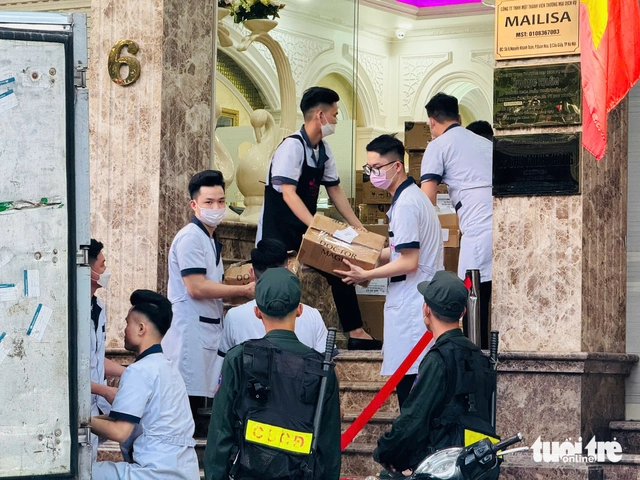
Police officers and Mailisa beauty clinic's staff load boxes onto a truck after nearly a full day of inspection by Hanoi police, November 2025. Photo: Danh Trong / Tuoi Tre
Since early 2025, the country’s once-booming livestream economy has been rocked by arrests and indictments involving prominent public figures who built large followings to promote cosmetics, supplements, and wellness products.
These cases share a common pattern: exploiting online influence to sell unregulated items, falsifying origins and certifications, and concealing revenue across complex corporate networks.
The crackdown signals a shift from administrative fines to full criminal prosecution, reshaping the landscape of livestream commerce and forcing platforms and influencers into a new era of transparency and legal compliance.
Mailisa beauty clinic owners arrested for large-scale cosmetic smuggling
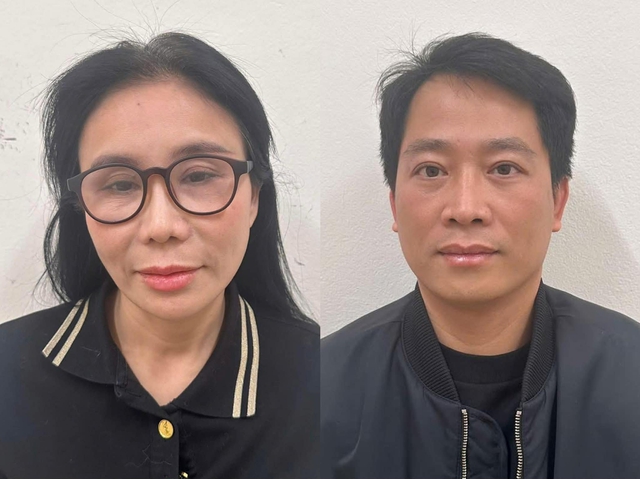
Mailisa beauty clinic owners Phan Thi Mai (L) and Hoang Kim Khanh (R). Photo: Vietnam's Ministry of Public Security
Police on Friday pressed charges against Mailisa beauty clinic owners Phan Thi Mai and Hoang Kim Khanh along with six associates for allegedly smuggling low-quality cosmetics from China into Vietnam and earning illicit profits worth trillions of Vietnamese dong. [VND1 trillion = $38 million]
Initial findings show that from 2020 to 2024, the group purchased low-cost cosmetics from Guangzhou that did not meet China’s requirements for a Certificate of Free Sale.
They allegedly worked with partners in China to create fabricated contracts that rerouted the goods through Hong Kong to secure the certificates.
The products were then brought into Vietnam as “Hong Kong premium cosmetics” and sold at many times their original price.
Authorities estimate the illegal profits reached trillions of Vietnamese dong from only a small portion of their bestselling items.
Mailisa built a powerful online presence through beauty consultations and luxurious livestreams.
Kera gummy scandal
Another major case involved Miss Grand International 2021 Nguyen Thuc Thuy Tien; Pham Quang Linh, known as ‘Quang Linh Vlogs;’ and Nguyen Thi Thai Hang, known as ‘Hang Du Muc,' all convicted of deceiving customers in promoting Kera Supergreens Gummies, a vegetable supplement sold by Chi Em Rot Group JSC (CER Group) and Asian Life JSC.
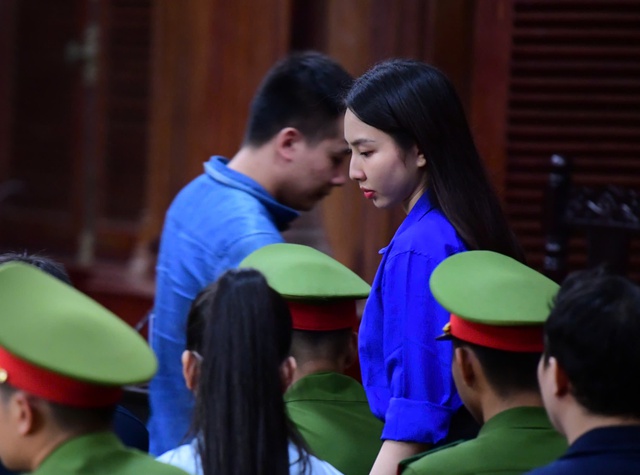
Miss Grand International 2021 Nguyen Thuc Thuy Tien and Pham Quang Linh stand trial in Ho Chi Minh City, November 19, 2025. Photo: Quang Dinh / Tuoi Tre
According to the Ho Chi Minh City People’s Court, the group joined CER Group shareholders to script and repeatedly livestream false claims about Kera, including the slogan “one gummy equals one plate of vegetables,” despite tests showing extremely low fiber content and no scientific basis.
From December 12, 2024, to March 14, 2025, the group sold 129,617 boxes of Kera Supergreens Gummies to 56,385 customers, earning over VND17.5 billion ($665,000), with nearly VND12.5 billion ($473,000) deemed illegal profits.
The court ruled that all defendants acted intentionally, failed to check product quality, and approved deceptive marketing scripts.
Although they had no aggravating factors, they received prison sentences due to the significant financial harm.
The court decided to impose a three-year sentence on CER Group board member Le Thanh Cong, while sending CER director Le Tuan Linh to prison for three years and three months.
CER chairwoman Nguyen Thi Thai Hang, CER board member Pham Quang Linh, and Nguyen Thuc Thuy Tien each received a two-year sentence.
All five were fined an additional VND50 million ($1,900) each.
Hanayuki fake sunscreen case
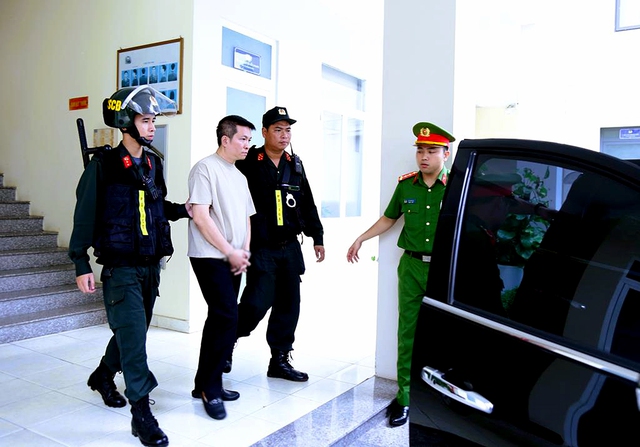
Nguyen Quoc Vu, CEO of VB Group, is arrested or allegedly producing counterfeit Hanayuki Sunscreen Body products, November 2025. Photo: Supplied
Police in Dong Nai Province, southern Vietnam on November 5 arrested Nguyen Quoc Vu, CEO of VB Group; Dinh Van Lien; and Nguyen Thi Tuyen for allegedly producing counterfeit Hanayuki Sunscreen Body products at the EBC Dong Nai Medical Factory JSC.
Investigators said the group manufactured 1,652 fake sunscreen bottles with real SPF performance reaching only 51.64 percent of what was advertised.
Vu is known online through his wife, influencer Doan Di Bang, who built a major beauty and supplement brand around her public persona.
Ngan 98 accused of producing banned, unsafe supplements
Last month, police in Ho Chi Minh City detained Vo Thi Ngoc Ngan, known as DJ 'Ngan 98,' for producing and selling counterfeit health supplements.
Through ZuBu Service Trading Co., Ltd. and ZuBu Shop, she contracted factories in Hanoi to produce weight-loss items and simultaneously made unlicensed products branded Super Detox X3, X7, and X1000.
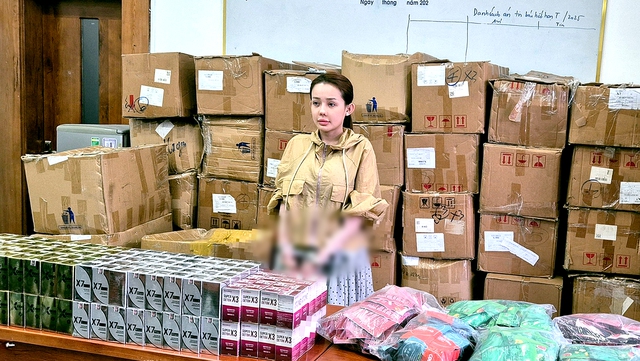
Vo Thi Ngoc Ngan, known as 'Ngan 98'. Photo: Ho Chi Minh City Department of Public Security
Lab tests revealed the capsules contained sibutramine and phenolphthalein, both prohibited due to risks of heart problems, digestive disorders, and cancer.
Revenue from 2023 to 2024 reportedly reached hundreds of billions of Vietnamese dong, with investigators describing her as the mastermind who exploited her massive following and controversial image to boost sales.
Hoang Huong charged with massive tax evasion

Hoang Thi Huong, commonly known as 'Hoang Huong.' Photo: Vietnam Television
On October 3, police charged Hoang Thi Huong, commonly known as 'Hoang Huong,' for serious accounting violations connected to an extensive tax-evasion network.
According to police reports, from January 2021 to June 2025, she concealed nearly VND1,800 billion ($68 million) in revenue and misreported VAT on VND2,100 billion ($80 million).
Her ecosystem included 18 companies, 25 household businesses, and 44 proxy owners.
Huong gained fame through aggressive supplement and wellness product livestreams, where she claimed huge daily sales volumes and often courted controversy.
More TikTokers charged as trust in livestream commerce deteriorates
Since early 2025, several other prominent TikTok creators have faced charges.
Among them, Vu Nam Phuong, known as Vu Hong Phuc or ‘Cun Bong’, and her husband Nguyen Nam Thang, were accused of reporting only VND5 billion ($189,300) in revenue despite earning more than VND120 billion ($4.5 million), causing tax losses exceeding VND10 billion ($379,000), according to local newspaper Vietnamnet.
In mid-June, Le Van Hai, whose ‘Gia dinh Hai Sen’ (Hai Sen Family) TikTok account had 2.6 million followers at the time, was detained for selling counterfeit supplements through Hai Be Company.
These cases have been described as a shock to public trust, particularly after years in which million-view livestreams built a new generation of online sales idols.
Across all the cases, investigators emphasized a shared goal of stopping illegal profit networks, recovering state revenue, and restoring public trust.
Police agencies described the cases as serious, widely discussed, and damaging to market integrity.
With stronger legal frameworks and closer cooperation between regulators and e-commerce platforms, Vietnam is redefining the livestream commerce environment.
The industry now faces a future where transparency, documented origins, and lawful advertising are no longer optional, but essential for survival.


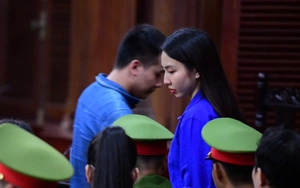
Max: 1500 characters
There are no comments yet. Be the first to comment.